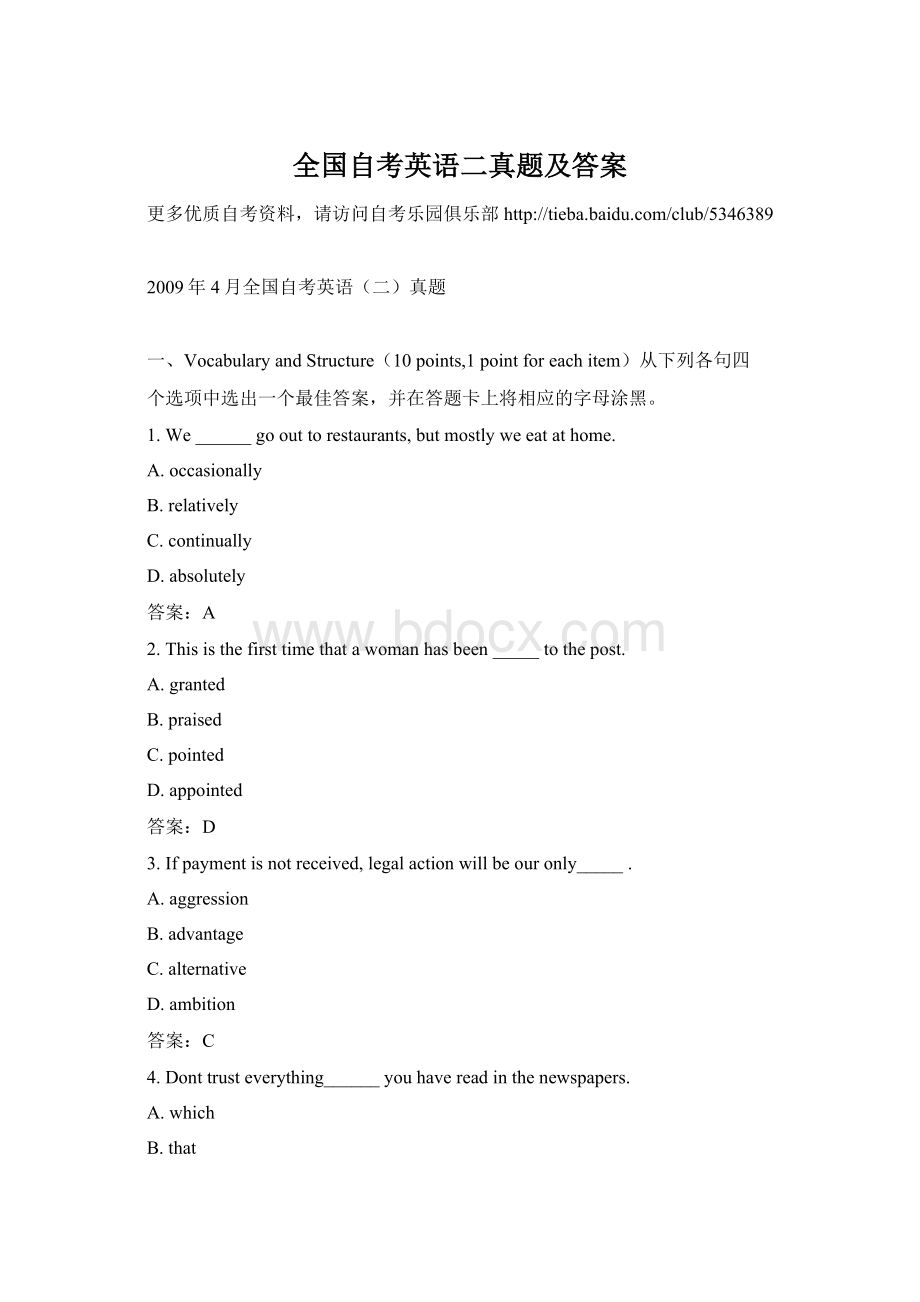全国自考英语二真题及答案Word文档格式.docx
《全国自考英语二真题及答案Word文档格式.docx》由会员分享,可在线阅读,更多相关《全国自考英语二真题及答案Word文档格式.docx(14页珍藏版)》请在冰豆网上搜索。

3.Ifpaymentisnotreceived,legalactionwillbeouronly_____.
A.aggression
B.advantage
C.alternative
D.ambition
C
4.Donttrusteverything______youhavereadinthenewspapers.
A.which
B.that
C.as
D.what
B
5.Theconclusionfromthestudyisnotdefinite;
itisjust_____.
A.tentative
B.valid
C.technical
D.thorough
6.She_____everythingelseandconcentratedonthetaskbeforeher.
A.setoff
B.setback
C.setaside
D.setup
7.Whenyou_____knowBobbetter,youwilllikehim.
A.goto
B.gotto
C.wentto
D.getto
8.Ivegottheorderfromthebossthatthework______finishedbefore5p.m.
today.
A.wouldbe
B.be
C.willhavebeen
D.couldbe
9.______Tomhasdonereallyamazedeveryoneinhisclass.
A.What
B.Which
C.That
D.Who
10.Itisnotdecided_____theconferencewillbeheld.
A.what
B.which
C.when
D.that
二、ClozeTest(10points,1pointforeachitem)下列短文中有十个空白,每个
空白有四个选项。
根据上下文要求选出最佳答案,并在答题纸上将相应的字母涂黑。
1.Weallbelievethatmoderntechnologycanmakelifebetterbecauseitmakes
everythingfaster.Butby11everythingup,wesufferlosseswehavenotyetlearnt
toknow.Ourdaybeginswithspeedyurges:
thealarmringsandyoujump12bed.You
takeaquickshower.Thenyouwakethekidsand13themthroughbreakfastsothey
wontmissthebus.Atthediningtable,youswallowsomeslicesofbreadwithacup
oftea.Wheneverything14,youhurrytothecar,thinkingofthethingsyouwould
buyfromthesupermarketontheway15.Driving20minutesinthebusytraffic,you
reachyourworkplace,rushingintothebuildingand16upthestairsthreeata
time,arrivingatyourdeskwithsecondstospare.Youtake17deepbreaths.Then,
youinstantlyrememberthatthe18youdidntfinishlastnightmustbefaxedto
Beijingby10oclockinthemorning.
Yetitseemsthatthe19wego,thefurtherwefallbehind.Notonlyintheliteral
senseofnotgettingdonewhatwesetouttodo,20atadeeperlevel.Ithascome
tothepointwheremydaysfeellikeanOlympicmarathon.
(1).
三、ReadingComprehension(30points,2pointsforeachitem)从下列每篇短文
的问题后所给的四个选择项中选出一个最佳答案,并在答题卡上将相应的字母涂黑。
1.Parentscanhaveagreatimpactonthedevelopmentoftheirchildrens
creativityinart.Butfirst,theyhavetoknowhow.Theymayfindthefollowing
adviceinterestingandinstructive.
Encouragefreedrawingratherthancoloringbooks.Coloringbooksstopthe
possibilityofselfexpression.Achildmayjustenjoycolorfulpicturesandnever
learnhowtoexpresshimself.Asanartteachersays,“Childrenhaveavery
powerfulinstincttodrawfreelyandroughly.Suchpracticemakesthemlearn
languageeasily.”Infact,achildexpresseshimselfinroughdrawing.Thisisthe
beginningofliteracyandcreativity.Also,parentsshouldnotteachtheir
kids“how”todrawandtheyshouldnotmaketheirkidsdrawrealisticpicturesto
entertainthemselves.Experiencetellsusthatsuchteachingfromtheparentswill
discouragechildren,makingthemthinktheycantdoitthe“right”way.
Competitionandrewardsshouldalsobeavoidedintheprocessofartisticcreation.
Achildsnaturalinstincttocreatewilldisappearifheorshethinksaboutprize
whiledrawing.
Parentsshouldberolemodelsfortheirkids.Theyshouldnotsaythingslike,“I
cantdrawastraightline.”Instead,theyshouldlearntosay,“Iloveto
create.”Thisteacheschildrenthattheprocessofcreationismoreimportantthan
theproduct.Ifchildrenseetheirparentsdrawing,cookingorbuildingcreatively,
theywilldothesame.
Buyanotebookforyourchildtouseeveryday.Thiscanbeajournalformakingup
stories,writingideasanddrawingpictures.Eventheyoungestchildcanuseitto
drawfreelyandroughly,expressinghimself.
Takeyourchildtoplacesthatpromoteideasandcreativity.Artmuseums,science
centers,librariesandchildrensmuseumsallaregreatplacestoseeotherpeoples
creativity.Thatwillinspirechildrentomaketheirowncreationsandinventions.
Givechildrenchoicesandfreetime.Someofthebestideascomefromdaydreaming
andimagining.
Inshort,parentsshouldallowtheirkidstohavethefreedomtoinventfor
themselves.Thatmeansnotalwaysteachingandcommanding.
(1).Todeveloptheirartisticcreativity,childrenshouldbeencouragedto
______.
(A).drawfreelyandroughly
(B).learntodrawrealisticpictures
(C).knowhowtodrawbeforetheystart
(D).learntodrawgoodpicturestogetprizes
(2).Parentsareencouragedtoberolemodelsfortheirkidsbecause.
(A).parentslovetocreate
(B).parentscandrawstraightlines
(C).childrentendtofollowtheirparentsexamples
(D).childrenliketheproductoftheirparentscreativity
(3).Itcanbeinferredfromthepassagethatinartisticcreation.
(A).productismoreimportantthanprocess
(B).processismoreimportantthanproduct
(C).processandproductareequallyimportant
(D).bothprocessandproductareunimportant
(4).Tobeinspiredbyotherpeoplescreativity,childrenshould.
(A).writeideas
(B).makeupstories
(C).buygoodnotebooks
(D).visitmuseums,libraries,andsciencecenters
(5).Themainideaofthispassageisthat.
(A).childrenshouldbeencouragedtodrawfreely
(B).childrenshouldfollowtheirparentsexamples
(C).parentsshouldknowhowtocultivatetheirkidscreativity
(D).mostparentsteachtheirkidsconfidentlyandinstructively
2.Itisoftensaidthatpolitenesscostsnothing.Infact,itseemsthatalittle
morepolitenesscouldsavebusinesses£5billioneveryyear.Frequentlyhearingthe
phrase“thankyou”or“welldone”meansthesametostaffasamodestpayrise.
Praiseandencouragementalsomakesemployeesmorelikelytoworkhardandstayin
theirjobs.Inthiswaythebusinesscompaniescansavethecostoffindingnew
employees.Athirdof1,000workerssurveyedbyaconsultingfirmsaidtheydidnot
getthankedatallwhentheydidwell—andafurtherthirdsaidtheywerenot
thankedenough.Inbothcases,staffsaidtheyfeltundervalued,meaningtheywere
lesslikelytoexertthemselvesandweremorelikelytolookforemployment
elsewhere.
Theresultofthesurveyshowsthattherewouldbearound£52billionlossin
productivityiftheemployeesfeltlessappreciated.Accordingtothefirm,praising
staffhasthesamepositiveeffectasa1percentpayrise—andworksoutmuch
cheaperforbosses.Threeoutoffouremployeessaidthatregularacknowledgementby
theirbosseswasimportanttothem,butonlyaquartersaidtheywereactuallygiven
asmuchpraiseastheyfelttheyneeded.
Thesurveyfoundthatthoseinbluecollarandmanualjobswerelesslikelytobe
givenanyrecognitionfordoingwell.Butitseemsthattheymostneedsuchpraise.
Inregionalterms,Scottishstafffeltmostundervalued.Fouroutoftenworkers
saidtheywereneverthankedandeightoutoftensaidtheywouldlikemorepraise.
However,workersintheNorthEastarelessimpressedbybeingpraisedbytheboss,
asonly69percentsaidtheyfelttheneedtobetold“welldone”regularly.
Olderemployeesandwomenneedthemostreassurance,accordingtopsychologist
AverilLeimon.Shesaidthatwordsofpraisedidmorethancreatingapleasantplace
towork—theycouldevenpromoteprofits.
(1).Thesurveyindicatesthatpolitenesscouldsavebusinessesahugeamountof
moneyeveryyearbecause.
(A).politenessmakesemployeesexpectpayrise
(B).politenessislesslikelytomakestaffworkharder
(C).politenesshelpsemployersfindproperemployees
(D).politenesshelpsemployersreducethecostofstaffemployment
(2).Workersdoingwellbutnotgettingthanksfromtheirbosseswillprobably.
(A).leaveforjobselsewhere
(B).workhardertogetpraisefromtheirbosses
(C).exertthemselvesintheirworktogetpayrise
(D).workhardertogetencouragementfromtheirbosses
(3).Accordingtothesurvey,oftheemployeesbelievedtheywerepraisedas
muchasexpected.
(A).25%
(B).30%
(C).40%
(D).75%
(4).Thesurveyshowsthatthosewhodonotpaymuchattentiontopraiseare.
(A).stafffromScotland
(B).workersinNorthEast
(C).olderandwomenemployees
(D).olderandwomenemployees
(5).Itcanbeconcludedfromthepassagethat.
(A).bluecollaremployeesareexpectingmorepayrise
(B).pleasantworkplacecouldpromotebusinessprofits
(C).payriseisanimportantmotivationformanualworkers
(D).wordsofpraisecouldpossiblyincreasebusinessprofits
3.Acenturiesoldtradition,illustratedinamodernchildrensbook,linksthe
sweetnessofhoneywiththejoyoflearningtoread.
“Thegrandpaheldajarofhoneysothatallthefamilycouldsee.Hethendippeda
spoonintoitandputsomehoneyonthecoverofasmallbook.
Thelittlegirlhadjustturnedfive.
‘Standup,littleone,’he